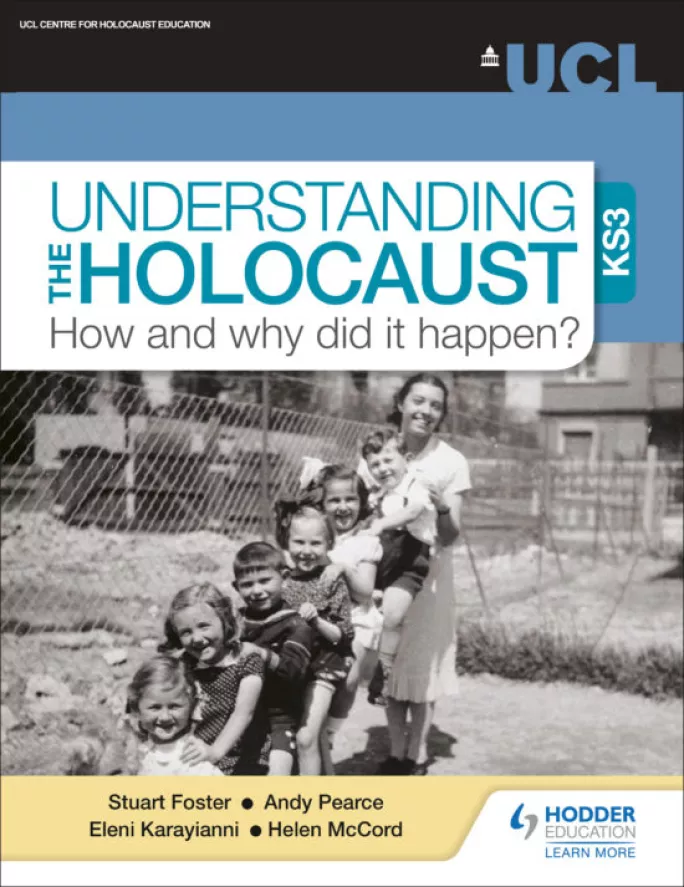- Home
- Free UCL Holocaust textbook for KS3 teachers
Free UCL Holocaust textbook for KS3 teachers

A new textbook has been launched for secondary school teachers to help improve the teaching of the Holocaust, with 30,000 copies available to teachers in state-maintained secondary schools free of charge from the first print run.
The book has been produced by academics in the Centre for Holocaust Education at UCL and is titled Understanding the Holocaust: How and why did it happen?
It is specifically designed for use with students at key stage 3 and has been published by Hodder Education.
WATCH: Professor Stuart Foster, executive director for the Centre for Holocaust Education at UCL, discuss the new book
The book has been produced in response to several research projects carried out over the past 10 years by the centre that found notable gaps in children’s understanding of the causes of the Holocaust, those responsible and those targeted.
Tackling misconceptions about the Holocaust
“What we found was that there were significant gaps in students’ knowledge and understanding,” explains Professor Andy Pearce from UCL.
He explains that the research also found that many pupils filled in these gaps with “myths and misconceptions in wider culture” that led to major shortcomings in their understanding of the Holocaust.
For example, many children grossly overestimated how many Jews were in Germany before the war or did not understand that the Nazi party was the active ruling political party of Germany during most of the 1930s, with many believing it was a paramilitary group operating outside politics.
Many children also fell into a simplistic idea of attributing the Holocaust solely to Hitler, rather than understanding the wider circle of upper leaders who were also responsible, the huge system set up to carry out the atrocity or the roles of more everyday people in its operation.
The importance of detail
To help counter these issues and give teachers a more complete resource to teach this topic, the textbook goes into a lot more detail about all aspects of the Holocaust.
“Most textbooks only have a few pages to cover the subject and that is an immediate challenge, but we are lucky and haven’t had to be limited in that way so we can go into a lot more detail,” says Pearce.
To do this, the authors have drawn on the past 20 years of research into what makes good history teaching and so the book does not just teach key facts, dates and names but also brings in conceptual understanding and second-order concepts.
“The textbook has been designed in a way whereby teachers and students can effectively construct their own way through the textbook. It’s broken into six units and within each unit there’s a number of chapters so a teacher could decide to focus on one of those units, two or three or all of them. It’s up to them,” says Pearce.
Agency for the victims
One area the researchers have tried to pay particular attention to is providing more agency and voice to the victims of the Holocaust, having found that many children did not fully appreciate the reality of those affected or who they were.
“One thing we have done in the textbook is really tried to foreground the voices of the victims - who they were and where they came from - and relate this,” says Pearce.
“Sometimes schemes of work [on the Holocaust] cast the Jewish people as almost emerging out of nowhere to have this horrible event happen to them and then they disappear again, so there is little agency accorded to them.”
And, conversely, as well as trying to humanise the victims, the books also tries to do the same for the perpetrators in order to make it possible for students to understand how ordinary people came to be involved in such a horrific event in history.
“The perpetrators of this genocide are often seen as demonic, monstrous or beyond belief, but this was a human event and it happened in a context that was very real across a continent,” Pearce explains.
“It may make sense for pupils to say, ‘Hitler did it,’ when talking about the Holocaust and that he did it because ‘there were lots of Jews in Germany’, but these mythologies need to be unpicked and corrected.”
How to get a copy
At present 30,000 copies of the book have been produced and teachers can request up to 30 copies for their class by completing a short 45-minute CPD course on the teaching of the Holocaust run by the UCL team.
Many orders have already been placed but there are still plenty of copies available on a first-come, first-served basis. Those interested in securing sets for their school can visit the website.
The team already anticipates producing more in time as they hope that demand will surpass the initial 30,000 order.
Furthermore, teachers especially keen to get a copy can buy it from the publisher direct for £7.99 a copy.
The development, design and distribution of the textbook has been funded by the Pears Foundation and the Toni Schiff Memorial Fund.
“We are incredibly grateful to the Toni Schiff Memorial Fund and Pears Foundation for funding this landmark project”, added Professor Stuart Foster, executive director for the Centre for Holocaust Education
The choice of the cover
The cover of the book can be seen below and a story on the cover image, who it depicts and why it was chosen can be read on the UCL website.

Keep reading for just £1 per month
You've reached your limit of free articles this month. Subscribe for £1 per month for three months and get:
- Unlimited access to all Tes magazine content
- Exclusive subscriber-only stories
- Award-winning email newsletters



